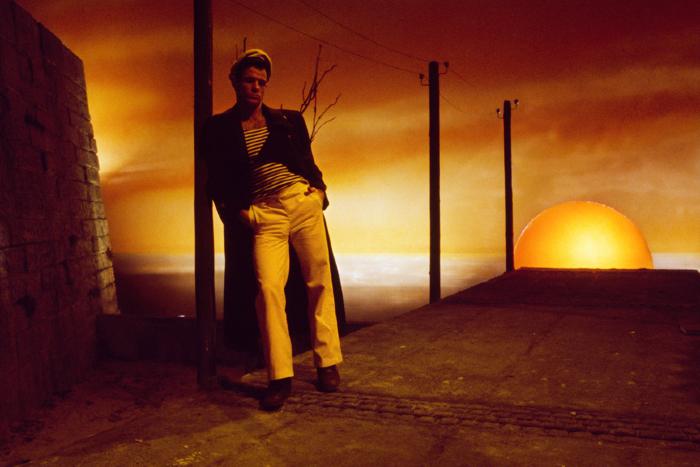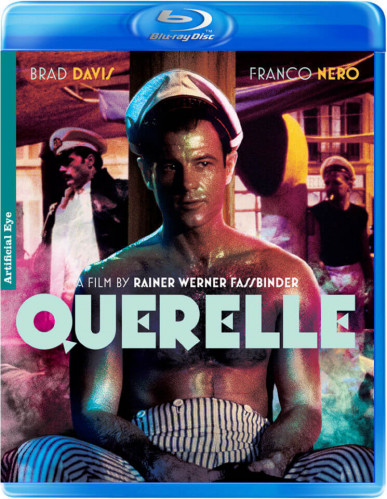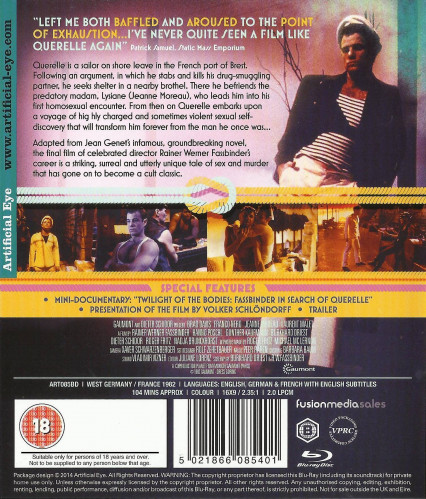QUERELLE [1982 / 2014] [Blu-ray] [UK Release] Rainer Werner Fassbinder’s Last and Most Controversial Film!
Querelle is a Belgium sailor on shore leave in the French port of Brest. Following and argument, in which he stabs and kills a drug-smuggling partner, he seeks shelter in a nearby brothel. There he befriends the predatory madam, Lysiane [Jean Moreau], who leads him into his first homosexual encounter. From then on Querelle embarks upon a voyage of highly charged and sometimes violent sexual self-discovery that will transform him forever from the man he once was . . .
‘QUERELLE’ is a 1982 West German-French English-language drama film directed by Rainer Werner Fassbinder and starring Brad Davis, adapted from French author Jean Genet's 1947 novel Querelle de Brest. It marked Rainer Werner Fassbinder 's final film as a writer/director; t is also the final film of celebrated director Rainer Werner Fassbinder’s career, in making this film his most striking, surreal and utterly unique tale of sex and murder, that has gone on to become a cult film classic of its genre.
FILM FACT No.1: Awards and Nominations: 1982 Venice Film Festival: Nominated: Golden Lion Award for Rainer Werner Fassbinder. 1984 Razzie Awards: Nominated: Worst Original Song for Peer Raben (music) and Oscar Wilde (lyrics) for the song "Each Man Kills The Thing He Loves." Nominated: Worst Original Song for Peer Raben (music) and Jeanne Moreau (lyrics) for the song "Young and Joyful Bandit." Nominated: Worst Musical Score for Peer Raben.
FILM FACT No.2: ‘QUERELLE’ sold more than 100,000 tickets in the first three weeks after its release in Paris, the first time that a film with a strong gay theme had achieved such success. However, the film received mixed reviews; critics who praised it called it a "noble experiment," while detractors called it incoherent and disjointed. Penny Ashbrook calls ‘QUERELLE’ Rainer Werner Fassbinder's "perfect epitaph: an intensely personal statement that is the most uncompromising portrayal of gay male sensibility to come from a major filmmaker." Edmund White considers ‘QUERELLE’ the only film based on Jean Genet's book that works, calling it "visually as artificial and menacing as Jean Genet's prose." Jean Genet himself, in discussion with Dieter Schidor, said that he had not seen the film, commenting, "You can't smoke at the movies." Werner Schroeter had wanted to make a black and white film with amateur actors and location shots, but Rainer Werner Fassbinder instead shot it with professional actors in a lurid, expressionist colour, and on sets in the studio. Edmund White comments that the result is a film in which, "Everything is bathed in an artificial light and the architectural elements are all symbolic."
Cast: Brad Davis, Franco Nero, Jeanne Moreau, Laurent Malet, Hanno Pöschl, Günther Kaufmann, Burkhard Driest, Roger Fritz, Dieter Schidor, Natja Brunckhorst, Robert van Ackeren, Werner Asam, Isolde Barth, Axel Bauer, Neil Bell, Gilles Gavois, Wolf Gremm, Karl-Heinz von Hassel, Y Sa Lo, Michael McLernon, Frank Ripploh, Karl Scheydt, Vitus Zeplichal and Isa Jank
Director: Rainer Werner Fassbinder
Producers: Dieter Schidor, Michael McLernon and Sam Waynberg
Screenplay: Jean Genet (novel "Querelle de Brest"), Burkhard Driest (screenplay) and Rainer Werner Fassbinder (screenplay)
Cinematography: Josef Vavra (Director of Photography) and Xaver Schwarzenberger (Director of Photography)
Composer: Peer Raben
Image Resolution: 1080p
Aspect Ratio: 2.35:1
Audio: English: 2.0 LPCM Stereo Audio
French: 2.0 LPCM Stereo Audio
German: 2.0 LPCM Stereo Audio
Subtitles: English
Running Time: 104 minutes
Region: Region B/2
Number of discs: 1
Studio: Curzon Artificial Eye
Andrew’s Blu-ray Review: A prolific director of over 40 films in a fifteen-year-period, Rainer Werner Fassbinder made his final film in 1982: the homo-erotic ‘QUERELLE.’ It was released shortly after his death from heart failure, caused by an overdose of cocaine and other drugs taken while developing a future screenplay. Based on Jean Genet’s novel “Querelle de Brest” [1947], the adaptation caused an outcry on release due to its forthright depiction of gay sex, incestuous love and sadomasochistic murder. The film was dedicated to his former male lover, El Hedi ben Salem, an actor who had starred in many of Rainer Werner Fassbinder’s previous films and who died in prison a few years earlier.
Querelle [Brad Davis] is a sailor working in the French north-western military port of Brest. On the ship’s deck he is polishing the boots of his superior, Lieutenant Seblon [Franco Nero], working under a sweltering sun as sweat flows down his naked torso. Querelle later visits the harbour-front whorehouse, the “Hotel Feria Bar,” where he meets Mario [Burkhard Driest], the local cop; attired in a bare-chested leather waistcoat and cap, he comes across as a ‘Tom of Finland’ life study. The bar is owned by Lysiane [Jeanne Moreau] who reads the Tarot; her husband, Nono [Günther Kaufman], serves drinks. Nono offers the male patrons a risky game of dice; if they win they can choose whichever girl they want, but if they lose they have to offer up to Nono himself without hesitation.
Lieutenant Seblon [Franco Nero], voyeuristically spies the goings on, talking into a tape which records his homo-erotic yearnings for the sailors under his charge; and he fondles his crotch. He watches Querelle enter into an agreement with Vic Rivette [Dieter Schidor], a fellow sailor, regarding the illegal transfer of opium to Beirut. Later, after the opium is transferred out of the country by boat, in a quiet corner Vic strips to a small jockstrap as Querelle strokes a flick-knife. Querelle grabs Vic Rivette, lustfully slitting his throat and then kissing the lifeless body. Meanwhile, a local worker, Gil [Hanno Pöschl], wants to have sex with the sister of Roger Bataille [Laurent Malet], but is left wanting and kisses Roger in her place.
Robert (played in a dual-role by Hanno Pöschl), the brother of Querelle, has turned up at the “Hotel Feria Bar,” and is seduced by Lysiane [Jeanne Moreau]. Querelle cheats at dice to wilfully lose and is seduced by Nono in a very erotic way. When Robert learns of this, the two brother’s fight as a crucifixion procession travels the town. They dance around the walkers and produce flick-knifes but leave as the sound of police sirens arrive. Mario takes Querelle to one side, inquiring how it was to be seduced by Nono. They both get hard and masturbate, and Mario ultimately rides the sailor Querelle.
Gil is seen in the workers dormitory and is ridiculed by his co-workers led by the commanding Theo [Neil Bell]. A distraught Gil falls down to a table, drops his pants to his knees and offers his arse to the laughing men. Meeting in the bar the following day, he smashes a bottle into Theo’s neck, killing him. He escapes to a hideout with Roger his only visitor. Querelle sees Roger and, realising that Gil is now implicated in two murders, offers to help. He gives Gil a gun and asks him to rob Seblon. As they plan, knowing that they are both killers and brothers-in-blood, Querelle falls intensely in love with Gil. They kiss passionately. Gil is to escape to Bordeaux and, when a disguise is applied, Querelle realises that he looks remarkably like his brother – Robert.
A critical and commercial flop on release, ‘QUERELLE’ is indeed a problematic film. Shot in the technique of a theatre production, it predates many of the ‘Dogma 95 Manifesto’ stylizes instigated by, among others, Lars Von Trier. The actors are slightly stilted in their delivery of the lyrical script and often using exact quotes from the novel. Indeed, Lars Von Trier’s first film, ‘Element of Crime’ [1984], utilises the same drenched sweat aesthetic for its principal actors throughout, photographed in an orange after-glow that Rainer Werner Fassbinder implemented. Lars Von Trier would continue to pursue many of the facets of ‘QUERELLE,’ culminating in the likes of ‘Dogville’ [2004] and Thomas Vinterberg’s ‘Dear Wendy’ also 2004, which Lars Von Trier scripted.
Jean Moreau is slightly miscast and perhaps is too good an actress, in finding it difficult to hide the expressiveness in her face that is demanded by the ubiquity of both the role and her fellow actors. Far better is the wonderful Franco Nero. A worldwide star since the career defining ‘Django’ [1964], Franco Nero has the sense to underplay, reaction rather than proposition, and a stare that can kill a man stone-cold dead. Franco Nero continues to be much-in- demand with a scene-stealing appearance in ‘Django Unchained’ [2012] and the bated-breath anticipation of the forthcoming ‘Django Lives!’ [2014] on the fiftieth anniversary of the original film.
And then, of course, there is Brad Davis. After the BAFTA® nominated portrayal of Billy Hayes, the true story of a young college student caught smuggling drugs in Turkey, in Alan Parker’s ‘Midnight Express’ [1978], ‘QUERELLE’ would be the role he was most closely associated with. Aware that he was suffering from AIDS when he took the part, and especially with his gutsy, instinctual performance. Conscious that playing another homosexual, which he had played a number of gay parts, may constrain him for more populist work, he was unfortunately proven right. Sadly this was to be his last major theatrical film role.
The release on Blu-ray of ‘QUERELLE’ allows the film to be seen in a much superior image. When it had a limited cinema release, it meant that earlier viewings have mainly be seen largely been via inferior VHS Tape and the equally inferior DVD release, which have struggled to cope with the unusual orange-filtered cinematography and the sound-staged vocals. But with this Blu-ray release all visual problems have been banished and now you can see if for the first time in full glorious amazing unique colour experience and how the director Rainer Werner Fassbinder intended it to be viewed.
QUERELLE MUSIC TRACK LIST
THE TEARS OF THE LADY (Composed by David Ambach and Peer Raben) [Orchestrated by Peer Raben]
EACH MAN KILLS THE THING HE LOVES (Instrumental) (Composed by David Ambach and Peer Raben) [Orchestrated by Peer Raben]
EACH MAN KILLS THE THING HE LOVES (uncredited) (Lyrics by Oscar Wilde) (Music by Peer Raben) [Performed by Jeanne Moreau]
MEN ARE AT PEACE (Lyrics by Oscar Wilde) (Music by Peer Raben) [Performed by Jeanne Moreau]
SAILOR’S ACCORDION (Composed by David Ambach and Peer Raben) [Orchestrated by Peer Raben]
THE CROSS-ROAD (Composed by David Ambach and Peer Raben) [Orchestrated by Peer Raben]
A SHIP FOR THE BANDITS (Composed by David Ambach and Peer Raben) [Orchestrated by Peer Raben]
THE SELF-EXTRADITION (Composed by David Ambach and Peer Raben) [Orchestrated by Peer Raben]
YOUNG AND JOYFUL BANDIT (Music by Peer Raben) (Written by Jeanne Moreau) [Vocals by Günter Kaufmann]
WITH A BITTER LOOK (Composed by David Ambach and Peer Raben) [Orchestrated by Peer Raben]
THE SHIP AND THE SEAMAN (Composed by David Ambach and Peer Raben) [Orchestrated by Peer Raben]
Blu-ray Image Quality – ‘QUERELLE’ is presented via Curzon Artificial Eye in an aspect ratio of 2.35:1, and granted a stunning 1080p image transfer. The high-definition transfer is not identical to the French Gaumont label used for their Blu-ray release of ‘QUERELLE,’ but it appears to have been sourced from the same restored master the French Gaumont label worked with. Generally speaking, detail and clarity tend to fluctuate as the action moves from one location to another, but these fluctuations are part of Josef Vavra and Xaver Schwarzenberger's very unique photography. To be perfectly clear, different filters and colour enhancements have been used to achieve a certain “dreamy” look. Light and shadow are also manipulated in unique ways to enhance the ambient atmosphere. There are no traces of problematic sharpening adjustments. Some extremely light corrections have been applied, but the film has a moderately stable organic look. Viewers with large screens and projectors, in particular, should be very pleased with the improved image depth. Also, I would like to mention that while viewing the film I did not notice the light flicker which I spotted on the French Gaumont label Blu-ray release. Finally, there is no large debris, cuts, stains, or damage marks to report in this review. To sum it all up, even though there is room for some minor improvements this is indeed a very pleasing presentation of ‘QUERELLE,’ that is extremely easy to recommend. For the record, Curzon Artificial Eye has provided English subtitles for the main feature. Please Note: Playback Region B/2: This will not play on most Blu-ray players sold in North America, Central America, South America, Japan, North Korea, South Korea, Taiwan, Hong Kong and Southeast Asia. Learn more about Blu-ray region specifications.
Blu-ray Audio Quality – There are three audio tracks on this Blu-ray disc: English 2.0 LPCM Stereo Audio, French 2.0 LPCM Stereo Audio and German 2.0 LPCM Stereo Audio. The original English track is very good, it has a decent range of dynamics and the dialogue remains consistently crisp. There are no dropouts or audio distortions to report in this review either. This being said, the English Subtitles are a terrific bonus for this release – because some of the principal actors have rather thick accents, especially Franco Nero. Still, this isn't something that should stop you from picking up the Curzon Artificial Eye Blu-ray release.
Blu-ray Special Features and Extras:
Special Feature: Introduction to ‘QUERELLE’ by Volker Schlöndorff [2009] [1080p] [1.78:1] [6:21] Here is a very short special feature where get to hear views by acclaimed German director Volker Schlöndorff of such classic films as ‘The Lost Honour of Katharina Blum’ and ‘The Tin Drum’ recalls his first encounter with Rainer Werner Fassbinder and discusses the socio-political climate in Germany at the time when the film ‘QUERELLE’ was shot. Volker Schlöndorff talks in-depth in his home about the film ‘QUERELLE’ and also talks in-depth about the director Rainer Werner Fassbinder about extreme sexual outlook on life. This was a Gaumont Vidéo presentation. French with optional English subtitles.
Special Feature: The Twilight of Bodies: Fassbinder's Search for ‘QUERELLE’ [2009] [1080p] [2.35:1 / 1.78:1] [35:14] This excellent documentary produced by Pierre-Henri Gibert focuses on the production history of ‘QUERELLE’ and its creator’s life and legacy. They talk in-depth about the Author Jean Genet and his style of writing extreme sexual desires and experiences. Contributors include: Laurent Malet [French Actor], writer Claude Arnaud [French Writer] and Jene Genet [Audio only]. This was a Gaumont Vidéo presentation. French with optional English subtitles.
Finally, Rainer Werner Fassbinder's final film, ‘QUERELLE’ is a remarkably bold and stylish adaptation of Jean Genet's infamous novel, is truly in a league of its own. A few of Polish director Lech Majewski's films come close to replicating its unique atmosphere, but none of them are as naughty and provocative. ‘QUERELLE’ isn't for everyone, but if you like challenging yourself you shouldn't miss it. For a long time when I saw the cinema release I was blown away by its boldness of the time. Then when it was released onto the inferior DVD format, I was blown away again even more so, but now I feel I have definitely the ultimate release, that was well worth the wait, as I think the image quality is out of this world, despite a lot of negative reviews. The only negative aspect of this Blu-ray disc is that on the back cover it says that there is a Trailer, well obvious Artificial Eye have made an error of judgement here, as I feel it is identical to the French Gaumont label release and that it had the Trailer included. Despite this, I am still honoured and overjoyed to add this classic Rainer Werner Fassbinder film to my Blu-ray Collection. Highly Recommended!
Andrew C. Miller – Your Ultimate No.1 Film Aficionado
Le Cinema Paradiso
United Kingdom



